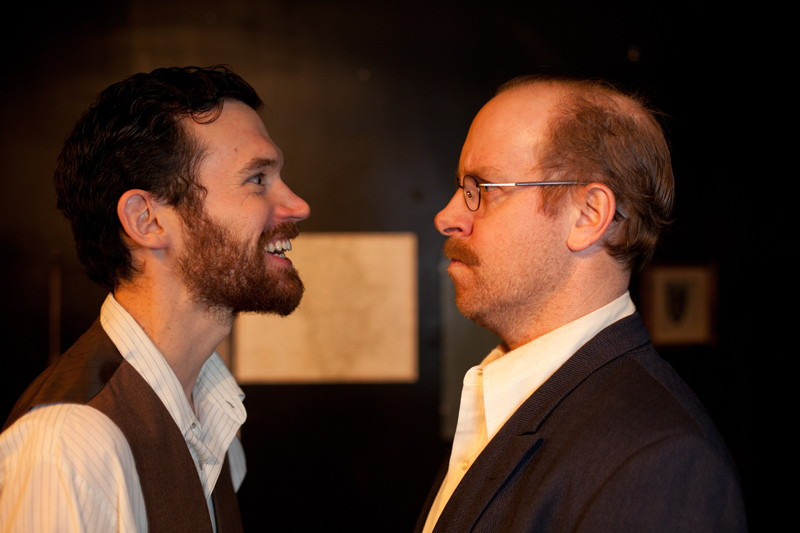Utterly dark and absolutely hilarious
Independent theatre company presents short but exuberant Strindberg play about conflicting moral beliefs
The word “pariah” defines an outcast, someone who is rejected by society, often for failing to adhere to the common morality.
The play Pariah, written by Swedish playwright August Strindberg, takes this definition and flips it around, rapidly and unapologetically.
Perhaps there is another definition of a pariah: one who ostracizes himself by creating his own separate morality.
The folks at Fancy Bred Theatre seem to think so.
Rod Beilfuss and Suzie Martin, both University of Winnipeg theatre grads, are the co-directors of Pariah, a production by Fancy Bred Theatre that is part of Strindberg Fest 2011, this year’s Master Playwright Festival held by MTC.
The pair, originally actors, have developed a taste for directing over the past few years and used their thespian talents as an effective directing tool for this project when they began working on it in July.
“ Pariah, like many of Strindberg’s plays, takes place in the twilight of uncertainty, in between realism and a psychological dream world
Pariah is a short but exuberant play about conflicting moral beliefs.
Mr. X, an anthropologist played by Chris Sabel, begins questioning Mr. Y, a traveler from America played by Glen Thompson, about his personal beliefs. In turn, Mr. Y begins the exact same passionate questioning about his own morals.
The result is something nervously funny, vaguely Nietzschean and satirically familiar. Without their beliefs, people become excruciatingly uncomfortable, regardless of the validity or basis of those beliefs.
Pariah, like many of Strindberg’s plays, takes place in the twilight of uncertainty, in between realism and a psychological dream world.
This grey area that Strindberg so frequently explores is embraced by the collaboration of Beilfuss and Martin’s direction.
Martin found the play utterly dark upon first reading it, while Beilfuss initially found Pariah absolutely hilarious.
“The fact that the play is hilarious would have never occurred to me without Rod,” Martin admitted.
Strindberg excels at making audiences feel uncomfortable and isolated, something that the directors ensured by staging their play in the cozy venue of Ragpickers (not to mention by effectively capitalizing on awkward silences).
One of the major changes that the directors made to Strindberg’s original text was to set the play in Africa instead of Sweden in order to emphasize the isolation of the characters.
Martin and Beilfuss also made religion play a more central part in the conflict between Mr. X and Mr. Y, using Christianity as a tool to connect the characters.
“When desperation settles in, they have to cling on to something else to survive,” said Beilfuss.
Pariah kicked off Strindberg Fest with a delightfully dark debate over morality and encourages audiences to embrace the weird, enjoy the uncomfortable and find humour in the absurd.
Pariah plays at Ragpickers Theatre (2nd floor, 216 McDermot Ave.) Jan. 28-29 and Feb. 4-5 at 7 p.m, and Feb. 6 at 1:30 p.m. Phone 477-6407 for reservations and more info.
Published in Volume 65, Number 17 of The Uniter (January 27, 2011)








